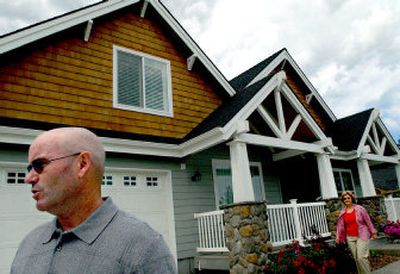Hundreds appealing assessments

Ed DePriest sat in front of Kootenai County commissioners Monday morning, arguing that the county’s new assessment on his mother’s southwest Hayden home was just plain wrong.
It should be worth almost $100,000 less than what county assessors figured it might sell for, DePriest said.
The commissioners disagreed and left the assessed value of Diane DePriest’s home at $473,857 – up 41 percent from last year’s assessed value of $335,785.
The DePriests’ case is one of 967 appeals the three commissioners, acting as the Kootenai County Board of Equalization, received this year.
They heard 194 of the cases before this week, and Monday was the original deadline for when appeal decisions were to be sent to the Idaho State Tax Commission. But the county received so many appeals this year that commissioners asked for an extension to July 31. That gives them 21 days to finish the rest – nearly 800 – if they don’t ask for even more time.
The appeal hearings move quickly. DePriest was given 10 minutes to make his mother’s case. The assessor’s office had 10 minutes to justify its assessment. Then the parties discussed the case in the final 10 minutes.
Commissioner Gus Johnson raced through a description of the appeal process, appearing to read off a script. When DePriest offered commissioners his research on the matter, Johnson interrupted him, speaking over DePriest’s explanation of the material to ask him whether he had a professional appraisal done.
“I just sensed an adversarial feeling in there,” he said afterward, standing next to his mother outside the commissioners’ offices. “I had people say, ‘You’re wasting your time,’ but I went in trying to tell myself that, no, if I go in with the … market figures … that we’ll get a fair hearing. I don’t get it. I just don’t get it.”
The DePriests were dejected and angry after their hearing. They believed the process was unfair and made no sense.
Ed DePriest said he compared the house to others currently for sale and showed that many homes sold for less than their initial asking price.
Assessors told Diane DePriest her home’s value was based on what other properties in the Loch Haven Hills neighborhood sold for in 2005. It didn’t matter how many bedrooms or bathrooms the house had or even what the view looked liked, she said.
Her son said assessor Gary Logsdon’s statistics just seemed like a way to spin the issue around what he was trying to point out. For instance, several houses in the neighborhood selling for $500,000 or more have been on the market for more than a year.
That doesn’t matter, they were told. Assessments are based on what sells, not what doesn’t.
Johnson said he agreed with the assessor’s decision because his nephew was selling a house in Loch Haven Hills for a large sum. But his nephew’s home was not one that the assessor looked at when reviewing market values in the area.
Logsdon said assessors create an assumed value of a property based on what a house could have sold for Jan. 1. He said prices of homes go up due to the cost of new construction, and even older neighborhood prices go up based on land values and what it would cost for a house that is depreciating to be remodeled.
On Stonehaven Drive, where Diane DePriest’s home is, homes are hardly depreciating, Logsdon said.
“They’re maintaining their homes,” he said.
And because of that they are, in a way, being penalized, he said.
Logsdon said he was impressed with how much research Ed DePriest did before the presentation. “I feel his pain. He really worked on this,” he said.
Logsdon said he, too, is a county resident. Logsdon moved away in 1996 to central Idaho but came back to Kootenai County in 2003 and bought a home. “Mine’s doubled (in price),” he said. “I’m in the same boat as everybody else.”
As for DePriest, he’s not sure if they should take the fight to the next level: arguing the case to the state.
“I wouldn’t rule it out, though. It’s something we need to look at,” he said. He also sat in on other appeal hearings Monday.
“Almost a carbon copy of our meeting,” he said. “People said the same thing: ‘My house couldn’t sell for this,’ and on and on and on.”
Logsdon said that home assessments could fluctuate next year because a full revaluation of each property will take place in Diane DePriest’s neighborhood.
The state requires that at least 20 percent of all properties be fully revalued each year, while the other 80 percent of homes are blanket-assessed based on market prices. He said DePriest’s property could rise, fall or stay the same in value based on that full study of each home in Loch Haven Hills. If homes stop selling in the area, prices could also drop, he said.
“If this neighborhood tanks in 2006, they’ll see it on their next assessment notice. That’s the bottom line.”